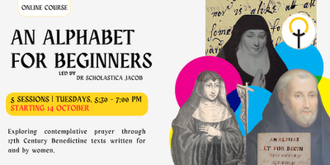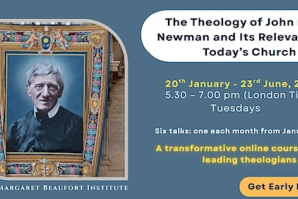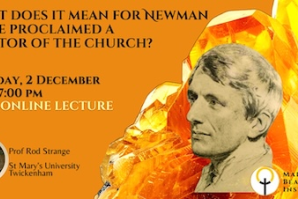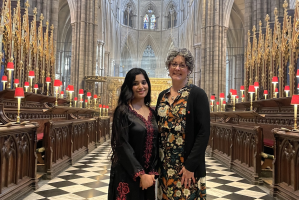An Alphabet for Beginners

Source: Margaret Beaufort Institute
"An alphabet for Beginners": exploring contemplative prayer through seventeenth century Benedictine texts, written by and for women.
This course offers a journey into contemplative and internal affective prayer, exploring seventeenth-century spiritual works written for and by women.
Much has been written in recent years about the Rule of St Benedict [RB] and its continued relevance today but although Benedict's Rule is a practical guide for living, it contains little about spiritual practices - indeed there is only one very short chapter on prayer. While we know that much of the Rule can be adapted for modern life, for those seeking a way into a deeper prayer life, we may draw on another Benedictine tradition - contemplative, silent prayer.
This is a difficult phenomenon to 'teach', as young English women four hundred years ago discovered. At a time when the penal laws in England made it impossible for them to live openly in religious communities, many made the journey to the Continent to found English convents in exile there. Among these was a Benedictine house established in Cambrai, in northern France, in 1623. The foundresses sought to break away from prescriptive contemporary practices based on mental exercises and to discover an authentic way to contemplation. A Welsh Benedictine monk, Fr Augustine Baker, came to their assistance and wrote a series of treatises specifically for them which drew on the medieval mystical tradition of apophatic prayer. In Baker we have a profoundly Benedictine guide who can speak as clearly to twenty-first century seekers as he did to his 'beginners' in Cambrai.
From their monastic enclosure, where life was centred on prayer in the Daily Office and private meditation, the nuns also actively engaged in missionary work through the apostleship of the pen. They achieved this in their Scriptorium where they copied, composed and circulated spiritual texts for other religious women and for the wider English recusant community. The English mystical tradition of contemplation was passed on largely through these women. The newly discovered manuscript also provides new evidence of the nuns' outreach to the secular clergy.
This short course is built around a recently discovered manuscript volume containing an introduction to mystical prayer written by Fr Augustine Baker, the 'Alphabet for Beginners', for the novices at Cambrai as well as texts composed by the nuns themselves. It will draw on Baker's teaching and the nuns' practices of lectio divina using the lives and writings of these women to understand their distinctive and personal prayer life.
Focusing on a specific text and episode in the history of the community at Cambrai, each session will combine textual analysis, historical narrative and biographical studies to examine how contemplation empowered the young community. There will be an opportunity for discussion and a sharing of how the texts speak to us today.
To subscribe and learn more about this course, starting on 14th October, visit:
An Alphabet for Beginners - Margaret Beaufort Institute
Book before 1st October to receive a £20 discount.
After this date, the full course fee of £150 applies.
About the course leader:
Dr Scholastica Jacob currently works for the Society of the Sacred Mission, which has launched the Herbert Kelly Institute in Durham. This provides a central repository for Anglican community archives as well as encouraging research into all aspects of religious life and building a specialist library on the subject. She has recently completed a Pearl Research Fellowship at the Margaret Beaufort Institute, Cambridge on 'Creativity from the Cloister: enclosed women and their impact of Catholic revival 1850-1950' and has led seminars on this subject. Scholastica has written entries for four of the women in the forthcoming 'Women in British Churches: A Dictionary of National Biography' for Bloomsbury. Her doctorate awarded by Durham University in 2022, 'From Exile to Exile: Repatriation, Resettlement and the Contemplative Experience of English Benedictine Nuns in England 1795 - 1838' is due to be published later this year. In a previous life Scholastica was a nun at Stanbrook Abbey, England (originally founded in Cambrai) and is also working on a recently discovered manuscript anthology of the Cambrai spiritual guide Augustine Baker's writings.


















